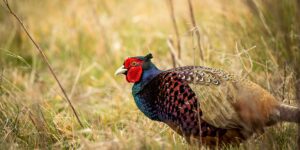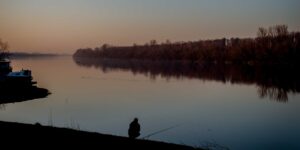We all know fishing isn’t just a hobby. The excitement you get when you hook a fish on your line is like nothing else! But if you are interested in fishing on private property, you may be wondering, “Do I need a fishing license to fish on private property?” In most cases, it depends on the fishing regulations in your state. This fishing guide will dish out some up-to-date information on fishing licenses, focusing especially on private ponds and private land.
Why limit yourself to public land when there are millions of acres of private land to explore.
The Importance of a Fishing License
Before we go into the nitty-gritty, let’s understand why a license is key. It’s a tool to control and maintain a balance in marine life, ensuring we don’t wipe out any species by overfishing. Overfishing can mess with the balance in the ecosystem. That’s where fishing licenses come in – they impose bag limits and control which species you can fish.
The General Rule for Fishing on Private Property
Usually, if you’re lucky enough to own a private pond on your own property with no inlets or outlets – in other words, a pond that’s fully contained – most states don’t require a fishing license. So, you’re free to fish on your private property without a license. However, if the water body is connected to a public water source, a few states might require a fishing license due to potential impacts on the broader ecosystem.
Varying State Laws
Fishing regulations and fishing license requirements can change a lot from state to state. For example, in Texas, private property owners and their guests can fish without a license in fully contained private ponds. But in North Dakota, you need a fishing license even for private ponds.
In Indiana, you don’t need a fishing license to fish in your own private pond, but only if the pond doesn’t connect to public waters. Florida, on the other hand, gives free licenses to residents who are 65 or older and kids under 16.
In South Carolina, you don’t need a fishing license for private ponds unless it’s a pay-to-fish lake. All this goes to show the importance of checking your state’s fishing regulations and fishing license requirements.
Fishing on Private Property By State
State Fishing Licenses
| State | License Required? | State License Info | Explanation |
|---|---|---|---|
| Alabama | No | Resources | No. You do not need a license to fish on private property in Alabama. |
| Alaska | Yes | Resources | Yes. You need a license to fish on private property in Alaska. |
| Arizona | No | Resources | No. You do not need a license to fish on private property in Arizona. |
| Arkansas | Yes | Resources | Yes. You need a license to fish on private property in Arkansas. |
| California | Yes | Resources | Yes. You need a license to fish on private property in California. |
| Colorado | Yes | Resources | Yes. You need a license to fish on private property in Colorado. |
| Connecticut | Yes | Resources | Yes. You need a license to fish on private property in Connecticut. |
| Delaware | No | Resources | No. You do not need a license to fish on private property in Delaware. |
| Florida | No | Resources | No. You do not need a license to fish on private property in Florida. |
| Georgia | No | Resources | No. You do not need a license to fish on private property in Georgia. |
| Hawaii | Yes | Resources | Yes. You need a license to fish on private property in Hawaii. |
| Idaho | No | Resources | No. You do not need a license to fish on private property in Idaho. |
| Illinois | No | Resources | No. You do not need a license to fish on private property in Illinois. |
| Indiana | No | Resources | No. You do not need a license to fish on private property in Indiana. |
| Iowa | No | Resources | No. You do not need a license to fish on private property in Alabama. |
| Kansas | No | Resources | No. You do not need a license to fish on private property in Alabama. |
| Kentucky | No | Resources | No. You do not need a license to fish on private property in Alabama. |
| Louisiana | No | Resources | No. You do not need a license to fish on private property in Alabama. |
| Maine | No | Resources | No. You do not need a license to fish on private property in Alabama. |
| Maryland | No | Resources | No. You do not need a license to fish on private property in Alabama. |
| Massachusetts | No | Resources | No. You do not need a license to fish on private property in Alabama. |
| Michigan | No | Resources | No. You do not need a license to fish on private property in Alabama. |
| Minnesota | Yes | Resources | Yes. You need a license to fish on private property in Minnesota. |
| Mississippi | No | Resources | No. You do not need a license to fish on private property in Alabama. |
| Missouri | No | Resources | No. You do not need a license to fish on private property in Alabama. |
| Montana | No | Resources | No. You do not need a license to fish on private property in Alabama. |
| Nebraska | No | Resources | No. You do not need a license to fish on private property in Alabama. |
| Nevada | Yes | Resources | Yes. You need a license to fish on private property in Nevada. |
| New Hampshire | Yes | Resources | Yes. You need a license to fish on private property in New Hampshire. |
| New Jersey | No | Resources | No. You do not need a license to fish on private property in Alabama. |
| New Mexico | No | Resources | No. You do not need a license to fish on private property in Alabama. |
| New York | No | Resources | No. You do not need a license to fish on private property in Alabama. |
| North Carolina | No | Resources | No. You do not need a license to fish on private property in Alabama. |
| North Dakota | Yes | Resources | Yes. You need a license to fish on private property in North Dakota. |
| Ohio | No | Resources | No. You do not need a license to fish on private property in Alabama. |
| Oklahoma | No | Resources | No. You do not need a license to fish on private property in Alabama. |
| Oregon | No | Resources | No. You do not need a license to fish on private property in Alabama. |
| Pennsylvania | No | Resources | No. You do not need a license to fish on private property in Alabama. |
| Rhode Island | No | Resources | No. You do not need a license to fish on private property in Alabama. |
| South Carolina | No | Resources | No. You do not need a license to fish on private property in Alabama. |
| South Dakota | No | Resources | No. You do not need a license to fish on private property in Alabama. |
| Tennessee | No | Resources | No. You do not need a license to fish on private property in Alabama. |
| Texas | No | Resources | No. You do not need a license to fish on private property in Alabama. |
| Utah | No | Resources | No. You do not need a license to fish on private property in Alabama. |
| Vermont | No | Resources | No. You do not need a license to fish on private property in Alabama. |
| Virginia | No | Resources | No. You do not need a license to fish on private property in Alabama. |
| Washington | No | Resources | No. You do not need a license to fish on private property in Alabama. |
| West Virginia | No | Resources | No. You do not need a license to fish on private property in Alabama. |
| Wisconsin | No | Resources | No. You do not need a license to fish on private property in Alabama. |
| Wyoming | No | Resources | No. You do not need a license to fish on private property in Alabama. |
| State | License Required? | State License Info | Explanation |
The Role of Public Access
Public access plays a big part in figuring out if you need a fishing license. In general, any water body with public access, or connected to public water, requires a fishing license. This holds even if you’re fishing from private land.
Fishing License Exceptions and Exemptions
There are some exceptions to the “need a fishing license” rule. These mostly apply to the owner of the private land and their immediate family. But, in some states, even guests need a fishing license.
For example, Kentucky’s regulations clearly state that guests fishing on private property still need a fishing license. So, it’s a good idea to get written permission from the landowner when fishing in a private pond, especially in a few states like this.
Keep Our Marine Life Safe
Fishing licenses on private property might seem like a nuisance to some, but they’re crucial for maintaining a balanced ecosystem. These rules not only prevent overfishing but also generate funds for conservation. Your license purchase contributes to the conservation of recreational fishing across your state.
The hassle free way to monetize your acreage.
FAQs
Do you need a fishing license in Texas to fish on your own property? In Texas, if your private property has a water body fully contained within it, you generally don’t need a license to fish.
Do you need a fishing license on private property in Indiana? In Indiana, you and your kids don’t need a license to fish on your own property, but guests do unless they meet certain exceptions.
Can you fish in NH without a license? In New Hampshire, you need a fishing license if you’re older than 16. Few exceptions exist for residents, but generally, a license is needed for both private and public property.
Who doesn’t need a fishing license in Florida? In Florida, residents who are 65 or older don’t need a fishing license. Other exceptions exist for kids under 16, disabled residents, and active-duty military.
Last Thoughts
Fishing licenses and private property is a complex issue, subject to varying state laws and regulations. It’s crucial to get up-to-date information from relevant local authorities or visit your state’s Department of Natural Resources website to know if you need a license to fish on your private land or in your private pond. Enjoy fishing, but always make sure you’re in line with the law.



